

|
Monthly archives: October 2006
Bill Lee
2006-10-31 11:22
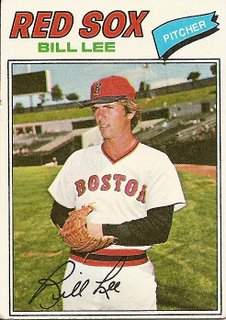 Unlike most Red Sox hurlers, Bill Lee was good at beating the Yankees. Keenly aware of this, Mickey Rivers and Graig Nettles conspired during a wild 1976 Red Sox-Yankees bench-clearing brawl to ambush Lee and rip his pitching arm out of its shoulder socket. He struggled the next couple of years for the Red Sox and in December 1978 the team, with the blessing of manager Don Zimmer, who hated and was hated by the nonconformist lefty, shipped Lee to the Expos for Stan "Little Papi" Papi, who proceeded to hit a Stan Papiesque .188 for the Red Sox while Lee turned in a classic "fuck you, Red Sox" year, going 16-10 with a 3.04 ERA. His major league career came to an end in 1982 when his one-game walkout to protest the release of teammate Rodney Scott resulted in the Expos showing him the same door they showed Rodney Scott. Unlike most Red Sox hurlers, Bill Lee was good at beating the Yankees. Keenly aware of this, Mickey Rivers and Graig Nettles conspired during a wild 1976 Red Sox-Yankees bench-clearing brawl to ambush Lee and rip his pitching arm out of its shoulder socket. He struggled the next couple of years for the Red Sox and in December 1978 the team, with the blessing of manager Don Zimmer, who hated and was hated by the nonconformist lefty, shipped Lee to the Expos for Stan "Little Papi" Papi, who proceeded to hit a Stan Papiesque .188 for the Red Sox while Lee turned in a classic "fuck you, Red Sox" year, going 16-10 with a 3.04 ERA. His major league career came to an end in 1982 when his one-game walkout to protest the release of teammate Rodney Scott resulted in the Expos showing him the same door they showed Rodney Scott.My Vermont childhood was coming toward a close around that time. My brother was away at boarding school (rooming with our friend from the Randolph Center days, Buster Olney), and the house adults, Mom and Tom, had both long-since given up on their dream of hippie grow-your-own-food self-sufficiency and had gotten regular full-time jobs, which made the house feel even emptier than it already might have in the glaring absence of my brother. In a couple years we three remainders would all go our separate ways, and maybe on some level we all knew the separation was coming. Maybe that's why we took our only trip as a threesome around then, a gray weekend visit to Montreal. I can only remember that there didn't seem to be very much to do on that trip. It was like life in general for me during that twilight time, as if the distractions that had wallpapered over the void for most of my childhood were dissolving. We wandered the streets, ate in a restaurant where you ordered in French, sat around the hotel, and, in the one gleaming highlight, went to a documentary, which as far as I know was never released in the U.S., about Bill Lee. Here he was in all his glory, talking about sprinkling marijuana on his pancakes, cursing Don Zimmer for his beady-eyed, self-righteous, slow-witted devotion to traditional thinking, lauding meditation as a way to take a snapshot of your mind at any moment, and blaming the chronic back problems that besieged Americans on the fact that we, unlike the more enlightened Japanese, were slavishly devoted to the con game of chairs. With his bushy Expos-era beard and his good-natured motormouth communist rantings, he seemed like one of Mom and Tom's friends from the old days of the hippie pot-luck suppers and the moonlight brandy-sipping cross-country ski outings. It makes sense to me that Bill Lee ended up settling post-career in Vermont, maybe the only major leaguer to ever have done so. Not only was it the midpoint between his two major league stops, it was also a land where a bearded iconoclastic weirdo could chairlessly sprinkle marijuana on his pancakes in rustic peace. It makes even more sense that when the Red Sox finally ended their sufferings in 2004 they did so in part by creating a reverse image of their dubious treatment of Lee, acquiring a certain pitcher from Montreal, who though otherwise extremely effective was generally undone by the Yankees, and who in a wild 2003 Yankees-Red Sox brawl deftly hoisted Yankee bench coach Don Zimmer on his own foolish petard. Lee, as usual, was not at a loss for words when asked to comment on Pedro Martinez's terse deflection of the onrushing Zimmer: "Maybe it knocked some sense into him. It's pretty hard to grab a bowling ball by the ears. What amazes me is that he didn't bounce. I would have been sure he was full of helium." One short year later, my brother and I were screaming our voices raw at the happiest parade since VJ Day. In closing, and apropos of nothing except maybe as a tribute to the way William Francis Spaceman Lee was always spilling over with raw irrational illogical life, I'd just like to add that the back of this card features a space-filling cartoon with a caption that reads as follows: "Pete LaCock is a son of television personality Peter Marshall." It is not the first instance of a major leaguer changing a surname from something potentially offensive, such as Marshall, to something completely immune to mockery, such as LaCock. In the late-1930s a man who had been born John Oscar Dicksus played under the name Johnny Dickshot. If you don't believe me, you can view his "stage name" and career numbers by clicking here. You'll also find a listing of his given name and be able to see that Johnny Dickshot's nickname was "Ugly." Gerald Henderson
2006-10-30 15:01
 "Reckon no man happy till you see the day he crosses the river that severs life from death, unscathed by woe." "Reckon no man happy till you see the day he crosses the river that severs life from death, unscathed by woe."-- Sophocles, Oedipus the King The general store in East Randolph didn't sell basketball cards, so I'm not sure where I got this 1981 Gerald Henderson card that I'm posting in honor of the passing of Henderson's onetime boss, the great Red Auerbach. I do know that 1981 was the year I first experienced what it was like to root for a championship team. I had been only vaguely aware of the Celtics championship in 1976, but by 1981 I had started playing "organized" (explanation for the quotation marks below) basketball myself and listening late into the night through heavy static to Johnny Most's shovel-on-concrete voice turn Celtics games into battles of tough and beleaguered good versus filthy cheating evil. In 1981 my own 8th grade basketball team was horrifically bad. Most of our pummelings at the hands of other Central Vermont squads were punctuated by my glasses getting raked off my face by somebody's swinging elbow. After a few of these incidents my frames inevitably broke and from then on each spectacles-related game-stoppage entailed both of my lenses dislodging from the frames and skittering across the floor. The ref eventually blew his whistle and members of both teams got down on their knees to locate the frame and lenses for me, at which point I'd then go to the bench and wrap some more nerdifying adhesive tape around them while my coach, the much-beloved community icon Mick Lewis, who would years later be imprisoned for molesting players on his consistently dominant little league team, rubbed his eye sockets with the heels of his hand in the manner of someone with a migraine. (Luckily, I was never a victim of his molestations, which I attribute in part to my ineptitude. I say this because the kid in my grade who claimed that he went camping with Mick and woke up to find the coach fellating him--a claim we all dismissed as impossible, the creation of a bald-faced liar--was an excellent athlete, and also because the one time Mick did do something to me that felt a little odd was right after I'd somehow miraculously scored two baskets in a row. Mick subbed for me after the second of these baskets, sat down next to me on the bench, and as play resumed told me what a good job I'd done and gave my thigh two unusually long and, well, ardent squeezes. Fortunately, I never came close to repeating my unprecedented scoring rampage.) Anyway, when I wasn't continuing my lifelong study of how it feels to lose, I was rooting for the Celtics, and they were winning. Let me tell you, it felt pretty fucking good to back a winner for once. So here's to Red Auerbach, who sagely snatched Gerald Henderson out of the oblivion of something called the Western League (there's a cartoon on the back of this card of, for some reason, some generic white guy who's supposed to be Henderson holding a trophy that says "MVP WEST. LEAG") in 1979 to back up the aging wizard Tiny Archibald. With Henderson's help, the Celtics nabbed the 1981 title. Three years later in a Finals matchup against a favored Lakers team that just seemed too fast and too good for the Celtics, Henderson executed the most important play in the history of his storied franchise--a last-second steal and layup--to help the Celts begin to turn the tide against the Lakers and win another title. That offseason Auerbach traded Henderson for a draft pick that the Celtics would, in 1986, after yet another championship, use to draft the apparent can't-miss superstar Lenny Bias. It looked to be one more in a long line of sweet deals orchestrated by the maestro of 16 NBA crowns, but of course Bias overdosed while freebasing cocaine on his very first night as a Celtic. Auerbach wept when he heard the news. This past Saturday as the greatest team builder who ever lived was taking his last breaths, I was at a Bob Dylan concert, and some words I heard sung that night in a Sophoclean Johnny Most growl occur to me now: "No man, no woman knows/the hour that sorrow will come." Rest in peace, Red. I guess losing is inevitable. But thank you for letting me know what it felt like, at least vicariously, at least temporarily, to be a winner. Adrian Devine
2006-10-29 07:20
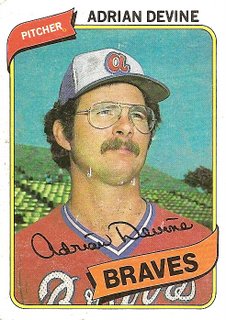 Many
fans of baseball history know that Ty Cobb became a very wealthy man
not on the strength of his demonic hall-of-fame career but rather by
investing heavily in a new company called Coca-Cola. In that light, the
Ty Cobb of the 1970s was Adrian Devine, shown here in a 1980 photograph
evincing smug confidence in his recent acquisition of a majority share
of stocks in Let It Breathe, Inc., which as everyone now knows is the
world-famous corporation concentrating solely on manufacturing products
made of mesh. Devine rounded out his prudent investment portfolio by
purchasing several of the now-ubiquitous Aviator Glasses "R" Us
franchises. Many
fans of baseball history know that Ty Cobb became a very wealthy man
not on the strength of his demonic hall-of-fame career but rather by
investing heavily in a new company called Coca-Cola. In that light, the
Ty Cobb of the 1970s was Adrian Devine, shown here in a 1980 photograph
evincing smug confidence in his recent acquisition of a majority share
of stocks in Let It Breathe, Inc., which as everyone now knows is the
world-famous corporation concentrating solely on manufacturing products
made of mesh. Devine rounded out his prudent investment portfolio by
purchasing several of the now-ubiquitous Aviator Glasses "R" Us
franchises.
Permalink |
No comments.
Jose Cardenal
2006-10-28 06:42
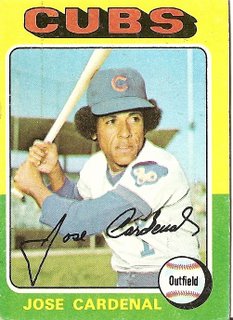 "'I
was six when I saw that everything was God, and my hair stood up, and
all that,' Teddy said. 'It was on a Sunday, I remember. My sister was
only a very tiny child then, and she was drinking her milk, and all of
a sudden I saw that she was God and the milk was God. I mean all she was doing was pouring God into God, if you know what I mean.'" "'I
was six when I saw that everything was God, and my hair stood up, and
all that,' Teddy said. 'It was on a Sunday, I remember. My sister was
only a very tiny child then, and she was drinking her milk, and all of
a sudden I saw that she was God and the milk was God. I mean all she was doing was pouring God into God, if you know what I mean.'"-- J.D. Salinger, "Teddy" Who better to honor the St. Louis Cardinals for winning the 2006 World Series championship than Jose Cardenal? One of my Cardboard God fugue states--episodes in which I sat on the floor of my room and handled the cards like rosary beads, eventually drifting into a glaze-eyed trance--involved envisioning the brief, magical sliver of the past in which journeyman Jose Cardenal had actually been a Cardinal. It had happened before I was old enough to pay attention and had lasted only a year and a half, from 1970 to midway through 1971, right around the time that my parents began experimenting with a new kind of family structure, three adults instead of two, inspired in part by the ecstatic mandate of Woodstock and the Whole Earth Catalog, etc., to invent brand new modes of living. Though it didn't end up lasting that long, many believed a new era was at hand, a golden time in which milk would pour into milk, God into God, Cardenal into Cardinal. Kent Tekulve
2006-10-27 06:56
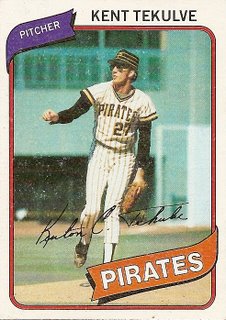 A
year or so before this 1980 card came into my possession, I read a
description of the title character in Louis L'Amour's novel, Hondo,
that may have changed my life. Hondo, this tan, unshaven,
high-cheekboned guy who slept on the ground under the stars and engaged
in knife fights with bloodthirsty Apaches and occasionally swooped down
from parched mesas to save defenseless women out on the most brutal
fringes of the 19th century American West, was characterized at one
point in the narrative as a loner. I clearly remember what I thought
upon reading this: when I grow up I want to be a loner. It
seemed tough and mysterious. You'd occasionally ride into town for your
grim, manly supplies and people would look at you with awe, respect,
even envy. A
year or so before this 1980 card came into my possession, I read a
description of the title character in Louis L'Amour's novel, Hondo,
that may have changed my life. Hondo, this tan, unshaven,
high-cheekboned guy who slept on the ground under the stars and engaged
in knife fights with bloodthirsty Apaches and occasionally swooped down
from parched mesas to save defenseless women out on the most brutal
fringes of the 19th century American West, was characterized at one
point in the narrative as a loner. I clearly remember what I thought
upon reading this: when I grow up I want to be a loner. It
seemed tough and mysterious. You'd occasionally ride into town for your
grim, manly supplies and people would look at you with awe, respect,
even envy.Anyway, now I'm a 38-year-old part-time proofreader who yesterday sat alone in the company cafeteria for an excruciating five minutes near tables of people sitting in groups or at least pairs at a surprise baby shower for a coworker. When she was brought in by her manager I participated in the tepid corporate cheer--"Surprise!"--by briefly affixing a rigor-mortis smile to my face. A few moments later, one of the planners of the party mentioned something about starting up some games, so I left the room as quickly and unobtrusively as possible. I like to think I'm invisible but how invisible is a bespectacled 6'2", 200-pound man who badly needs a haircut? Probably most people didn't notice my exit, having plenty of other better things to think about, but perhaps some did notice, and I doubt they gazed at me with awe, respect, and envy. But back to my youth. By a year or so after reading Hondo, I had begun junior high and was beginning to experience the realistic dimensions of the life of a loner. I did poorly in school, my friends dwindled to a few misfits that I played chess with in the library, the basketball team I was on lost every game. Maybe I'll delve into it all in much greater depth some day when I'm not running late to my proofreading job, as I am now, so for now all I'll say is that Kent Tekulve, who wore glasses and threw underhand and didn't seem to have anything at all in common with the other loud and wild disco-dancing coke-snorting home-run smashing "We Are Family" World Champion Pirates, was one of my favorite players ever. I sincerely wish I had time to write more about him, but as the television advertisement that uses the theme of living life to the fullest to sell intoxicants puts it, life beckons. I have to go take that train to my cubicle. Willie Wilson
2006-10-26 06:35
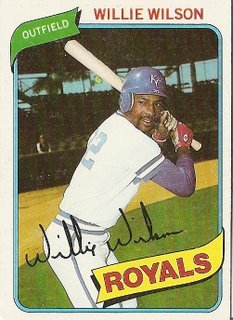 In
this 1980 card, Willie Wilson demonstrates that it's possible to look
fast even when standing still. Wilson epitomized the great Royals teams
of the late '70s to mid-'80s, even though he only became a regular in
1979, after the Royals had already taken three divisional titles. He
did help them win the last of those three titles as a 23-year-old bench
player unleashed in close games to unnerve the opposition with his
alarming speed. The first time I became aware of him was while
listening to a game at my aunt and uncle's that year. In
this 1980 card, Willie Wilson demonstrates that it's possible to look
fast even when standing still. Wilson epitomized the great Royals teams
of the late '70s to mid-'80s, even though he only became a regular in
1979, after the Royals had already taken three divisional titles. He
did help them win the last of those three titles as a 23-year-old bench
player unleashed in close games to unnerve the opposition with his
alarming speed. The first time I became aware of him was while
listening to a game at my aunt and uncle's that year.The Red Sox had been mutilating everyone in their path, but as usual they seemed to be having trouble on the fast artificial turf in Kansas City. While the Sox always tried and failed to muscle home runs out of the sparkling, spacious facility, the Royals bunted for hits, executed double steals with swat-team precision, and slapped clutch triples into the gaps. Even before Wilson's arrival, the Red Sox' attempts to subdue the Royals often resembled a weary gorilla throwing uppercuts at a battalion of malarial gnats. And in that game in 1978, maybe because I was listening to it and not watching it, radio allowing for the wider horizons of folklore, Wilson seemed not so much a promising prospect as a perfect essence of Royalness, the sum of the happiest baseball dreams of Freddy Patek and Amos Otis and Hal McRae. He entered the game as pinch-runner when the outcome was still in doubt. The announcers, Ned Martin and Jim Woods, instantly began speaking of him in almost hushed tones, and Wilson obliged their fearful and laudatory testimonials by stealing second, sprinting to third on a groundout, and flying home on a popup to shallow center by The Next Mickey Mantle, Clint Hurdle. Not incidentally, in retracing the details of this 7/21/78 Red Sox-Royals game at retrosheet.com, I was surprised to discover that Clint Hurdle had what may well have been his first, last, and only great day in the major leagues, knocking in six runs against an eventual 99-game-winning team. I have absolutely no memory of Clint Hurdle in this game, perhaps because he fades into his customary inconsequentiality next to Wilson, who seemed that day almost like a superhero, especially with his alliterative first and last names that recalled other superhero alter egos such as Peter Parker, Clark Kent, Bruce Banner, and Reed Richards. Willie Wilson. A lightning bolt in white and blue. John Lowenstein
2006-10-24 06:05
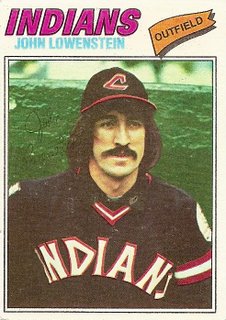 "And he wants to trade the game he plays for shelter." -- Leonard Cohen, "The Stranger Song" "And he wants to trade the game he plays for shelter." -- Leonard Cohen, "The Stranger Song"The Indians never got anywhere near first place throughout the 1970s (or 1960s or 1980s). Judging from this John Lowenstein card, the strain of toiling season after season without hope of ever reaching the glittering lights of the playoffs was something the Montana-born Lowenstein was singularly equipped to handle. His westward-trudging pioneer ancestors had probably endured droughts and floods and scurvy and crushing isolation and perhaps even grisly skirmishes with the demographic represented by the huge script across Lowenstein's chest. Replace the baseball uniform and cap with a dirty white shirt, fraying leather vest, and sagging mud-flecked bowler hat and Lowenstein is an extra in McCabe and Mrs. Miller, staring gauntly at the ceaseless gray drizzle, subsisting on diminishing rations of pemmican and horse oats, waiting uselessly for the shipment of prostitutes who though cheap will all be beyond his dismal means. George Foster
2006-10-23 07:42
 My family, minus my father, moved to Vermont in 1974, when I was six and my brother was eight. We house-sat for a year in a town called Randolph Center for a family spending a year as Christian missionaries in Korea. Randolph Center had many big white houses with immaculate lawns, and a college with brand new tennis courts, and a ski hill that in the summer became a place where hang-gliders launched themselves like bright-colored ponderous birds that seemed somehow simultaneously prehistoric and futuristic, and a big pond called Lake Champagne with a sun-drenched wooden dock in the middle of it and a building nearby with pinball machines and air hockey tables. My family, minus my father, moved to Vermont in 1974, when I was six and my brother was eight. We house-sat for a year in a town called Randolph Center for a family spending a year as Christian missionaries in Korea. Randolph Center had many big white houses with immaculate lawns, and a college with brand new tennis courts, and a ski hill that in the summer became a place where hang-gliders launched themselves like bright-colored ponderous birds that seemed somehow simultaneously prehistoric and futuristic, and a big pond called Lake Champagne with a sun-drenched wooden dock in the middle of it and a building nearby with pinball machines and air hockey tables.Kids were friendly in Randolph Center, a few of them coming by to basically welcome my brother and me aboard. One of these kids was a farmboy named Buster Olney, who even as a preadolescent had contagious enthusiasm for baseball, baseball history, and at that time most especially baseball cards. By the time we met him, or to put it more accurately were swept up in his tornado of baseball mania, his baseball card collection was already the stuff of legend--the rumor was that he kept the collection in a trunk that he'd buried somewhere on the grounds of the Whiffleball stadium he'd built on his family's lawn to resemble a miniature Fenway Park. When asked about this he would bark laughter then give answers as elusive as his unhittable Whiffleball pitches. My brother and I had bought stray packs of cards before, but under Buster's influence we began collecting, buying packs whenever possible at the general store in town called Floyd's, which was owned by Mr. Floyd, a chipper Vermonter with a Santa Claus build and a gray-flecked flattop buzzcut. When the family who owned the house we were living in came back from jesusing Korea, we moved down into the valley below Randolph Center, to East Randolph. East Randolph consisted of some run-down houses clinging to a section of Route 14 kind of like dried carcasses to a strip of cracking flypaper. There was a farm machinery dealership, a shallow swimming hole bracketed by a rusted car husk and a defunct gravel pit, and a general store called Race's that was, unsettlingly, not owned by Mr. Race but by a looming, often angry-seeming man from Pennsylvania named Mr. Heyder. Not long after we'd moved there, my father got my brother a speedometer for his bike, but not a mile was recorded on the odometer before a pack of cackling East Randolph kids mashed some sticky-pus weed-bulbs called wild cucumbers (which I'd never seen growing in Randolph Center) into the shining black face of the speedometer, breaking the needle and fouling the interior mechanisms. My enraged brother whaled on the main instigator until the kid, using his shifty East Randolph know-how, ended the barrage by yanking out a hunk of Ian's hair. It was the first in a series of fights between my brother and the East Randolph toughs, and the beginning of my lifelong practice of moving around in public as invisibly as possible so as to avoid victimization. Collecting baseball cards became somehow more solitary than it had been in Randolph Center. In Randolph Center any additions to the collection were discussed, or at least had the potential to be discussed, in a small but palpable community of Randolph Center baseball card collectors that included me, Ian, Buster, Buster's friend George, and sometimes even some other kids from Ian and Buster's little league team. In East Randolph it was just my brother and me, a reality that I would have been willing to embrace but that my brother often recoiled from. By the time I purchased the pack that included this 1978 George Foster card, the whole process had become as lonely and compulsive and privately rapturous as religious pilgrimage or addiction. In that light, this card represents the apex of my solitary obsession, for I remember the precise moment I found this card in a new pack, and it's the only Cardboard God that I can say that about. I had just bought the pack from the scowling Mr. Heyder and was walking home. I was by the spot on Route 14 where an abandoned general store with an "Esso" sign and dust-covered windows faced, across the road, an empty metal trailer that had briefly been a restaurant called Chez Rene. Sometimes I was able to delay gratification for a while, carrying the packs of cards (I usually bought two) all the way home before opening them, but on this day I must have needed that pain-killing hit just a little bit quicker and slid my finger under the plastic flaps, breaking the infinitesimally thin coat of glue and releasing the scent of the rectangular shard of gum that came in every pack. I put the shard in my mouth and was shattering it and releasing the first burst of sugar when I found this card amid the others. I saw the N.L. ALL STAR shield and I saw the name that I recognized from following its awe-inspiring march through the previous season's statistics pages in the newspapers. The broken-pieces phase of the gum gave way to the soft and cohesive sugary phase, and I heightened the all too brief moment, which would soon give way to the texture-of-a-pencil-eraser/flavor-of-spit-and-disappointment phase, by flipping the George Foster card over to affirm that the legend told by the newspaper statistics was true. After all, nothing was an inarguable fact until I saw it on a baseball card, and here it was: George Foster had hit 52 home runs during the 1977 season, the most any player had hit in a single season in my entire lifetime. In years to come the 50-home-run plateau would be robbed of its glory by steroidal cheaters and new cartoonish ballparks with dimensions barely bigger than Buster Olney's Whiffleball lawn, but in 1978 it was mythic. Only ancient guys from a black and white world that preceded the epoch of the Cardboard Gods had ever reached that Olympian height. But now George Foster had done it, and as sugar coursed through my body I held in my hands that very same George Foster, or at least a little sliver of George Foster that had fallen like a red and brown and white leaf all the way from the forests of heaven to the gravel-pit valley of East Randolph, Vermont. I paused for a moment to chew the already fading, hardening gum and stare at the ecstatic statistics, then hurried home before anyone could fuck with me.
Reggie Jackson
2006-10-20 06:26
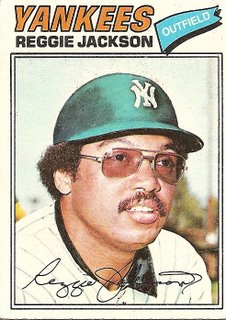 Polar bears will be extinct by the end of this century. I read that yesterday in an article by Peter Matthiessen on the Alaskan wilderness that is in danger of being obliterated for the short-term benefit of a few already impossibly wealthy oil men. I was on a Metra commuter train, cringing low on the upper level in hopes that the conductor below might not see me so I could save three bucks. At work earlier in the day I'd been in a meeting where the constant change of the company I'm employed by was discussed in light of a quote about gazelles getting eaten by lions. Be the lion, it was implied, or at least not the weakest gazelle. Polar bears will be extinct by the end of this century. I read that yesterday in an article by Peter Matthiessen on the Alaskan wilderness that is in danger of being obliterated for the short-term benefit of a few already impossibly wealthy oil men. I was on a Metra commuter train, cringing low on the upper level in hopes that the conductor below might not see me so I could save three bucks. At work earlier in the day I'd been in a meeting where the constant change of the company I'm employed by was discussed in light of a quote about gazelles getting eaten by lions. Be the lion, it was implied, or at least not the weakest gazelle.Anyway, here's that fuckhead Reggie Jackson, in another of Topps' doctored cards. Like Dave Cash, Reggie switched teams too soon before the start of the year for Topps to have a picture of him in a Yankee uniform on file, so they sprung for some Wite-Out and a black Bic and within moments, voila, what once was a wealthy Oriole is now an even wealthier Yankee. Unlike Dave Cash, Reggie doesn't seem to give a shit. Why should he? Doubt is for panting polar bears and introspective gazelles. I find it somehow comforting, in an impotently nostalgic way, that it's possible to see the crude residue of change in these cards. Undoubtedly when a similar situation arises today the cards are altered digitally, seamlessly, the wheels of change invisible. Every day I half expect to show up at my job to find that the nameplate on my cubicle has been removed. It wouldn't even surprise me that much if the whole building was gone.
Dave Cash
2006-10-19 06:16
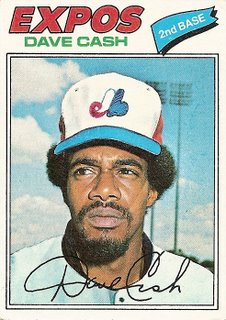 "That's strange. All the sudden I don't feel like myself." -- Daffy Duck "That's strange. All the sudden I don't feel like myself." -- Daffy DuckBut why would someone want to be an imposter? Perhaps it's a way to feel a sense of control over the inherently transitory nature of life. Everything changes, so maybe it's comforting or empowering to feel like the most intimate change possible, that of your identity, is something you can engineer. As a kid I often toyed with the idea of shucking my often burdensome identity as a Red Sox fan to become a supporter of the team that played in a domed stadium that was almost exactly as close to my Central Vermont home as Fenway Park (according to Google maps, the difference is less than two miles), vowing to become a Montreal Expos fan on the many occasions when the seemingly insurmountable (i.e., unchangeable) in-game or even divisional leads of the Red Sox melted like popsicles dropped on hot pavement. I think these vows, which I never really believed in, were ways to fantasize about a) hurting the Red Sox as they had hurt me, as if Carl Yastrzemski would weep inconsolably and Dick Drago would attempt to harm himself and Fred Lynn would begin questioning the existence of God, etc., when news of my defection reached Yawkey Way, and b) entrusting my psychic health to the stable if unremarkable fortunes of a team that had never won anything, rarely threatened to win anything, and, as it turned out, never would win anything before in essence ceasing to exist. Painless, in a way, or so it seemed. (Thinking of what did eventually become of them makes me wonder now whether the Expos, by moving their franchise out of Montreal and changing their name to the Washington Nationals, have in fact completely ceased to exist. If not, what's left of them? In George Saunders' story "Brad Carrigan, American"--from his brilliant new book, In Persuasion Nation--a character who gets written out of a television show attempts to hang on to his identity by repeating his own name while floating in "the bland gray space he's heard about all his life, the place one goes when one is Written Out." He knows that he will eventually exit the grayness to come back to life as a completely different character, and he senses that if he doesn't hold tight to his identity he will have no memory of ever being Brad Carrigan, American. But he allows his mind to wander to certain reminders of the immense worldwide suffering that went on at the borders of the profoundly insipid sit-com that had until moments before made up his entire world. He thinks of people killed in a horrific Central European slaughter and of starving children from the Philippines--"The poor things, he thinks."--and the digression from the simple repetition of his name is enough to doom his attempt to hang on to his identity in the midst of the obliterating grayness of his purgatory. The story concludes: "He is going, he realizes. "He is going, and he will not be coming back as Brad. "He must try to at least retain this feeling of pity. If he can, whoever he becomes will inherit this feeling, and be driven to act on it, and will not, as Brad now sees he has done, waste his life on accumulations, trivia, self-protection, and vanity. "He tries to say his name, but has, apparently, forgotten his name. "'Poor things,' he says, because these are now the only words he knows." So maybe, similarly, somewhere deep within the Washington Nationals is the vanished essence of the Montreal Expos uttering the words "Poor things." I certainly hope this is true, and even if it isn't, I'm going to believe it is.) Anyway, though I rooted peripherally for the Expos, I never did dump the Red Sox to become a full-blown Expos fan. I guess I don't enjoy changing or disguising my identity. (The idea of having to go to a costume party, for example, fills me with dread.) On the contrary, I think when push comes to shove I go to great lengths to reaffirm that my identity is fixed, that even when things are changing all around me there is a central point that cannot change. It's probably the fiction to which I hold most tightly. Judging from the look on his face, I think Dave Cash might know what I'm talking about. His expression is a pungently soulful counterpoint to the flat, affectless masks of the chameleon posing as Craig Swan and Carmen Fanzone. He seems acutely and sourly aware of what is happening to him: he is--as I never did--becoming a Montreal Expo before our eyes. Look closely at the unnatural white in his uniform and cap crown, at the unnatural blue on the bill of his cap, and, most especially, at the obvious pen-scribblings on the right half of the M on his cap. One interpretation of this is that Dave Cash moved from the Phillies to the Expos so close to the beginning of the 1977 season that Topps had to doctor their photo of him in a Phillies uniform. But I see this card as something akin to "Duck Amuck," the immortal Warner Brothers offering in which an unseen cartoonist keeps erasing the scenery around Daffy Duck and replacing it with completely different scenery. In other words, Dave Cash, against his will, is being transported by a possibly inebriated and/or incompetent employee of the Topps art department from his place as an all-star second-baseman on a division-winning Phillies team to an expansion squad in a foreign country with a suffering exchange rate, where he will waste the remainder of his prime toiling on fraying Astroturf in front of the empty plastic seats of a dome that will echo quietly with muttered Gallic curses that Dave Cash will be able to understand in his bones even though he doesn't speak a word of French. Why would someone want to be an imposter, to create and inhabit the persona of someone they're not, to for once take the reigns of ceaseless change? I'm not really sure. But ask Dave Cash. He might know. Carmen Fanzone, Part 3
2006-10-18 06:13
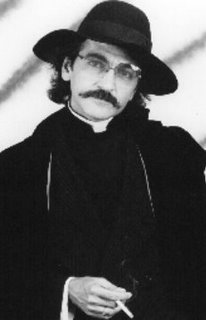 Case
closed? The baseball impostures seem to have tailed off in the
late-1970s, just as a comedic saboteur named Don Novello was gaining
notoriety for his Saturday Night Live character Father Guido
Sarducci (shown here). Blazing a trail later followed most notably by
Sacha Baron Cohen, Novello pushed his Sarducci characterization beyond
the limits of fiction by getting arrested at the Vatican in 1981 for
impersonating a priest. For some reason, no inquiry was made at the
time of the arrest into any other possible past impersonations, and the
strange case of Carmen Fanzone aka Craig Swan was never solved. As
recently as 2000, Novello seemed to wink about his unnoticed years as a
mustachioed major league baseball cipher by writing the San Francisco
Giants a sardonic letter containing an idea about employing Portuguese
Water Dogs to retrieve home runs hit into the bay just beyond the
borders of their new ballpark. The Giants, in addition to not
recognizing Novello's apparent desire to be punished for mocking
baseball by leading the league in earned run average the same year he
made several appearances on a nationally televised comedy show, also
failed to fathom the satiric nature of the letter and promptly
implemented the idea. When the Giants subsequently discontinued the
program, Novello put a curse on the franchise. Case
closed? The baseball impostures seem to have tailed off in the
late-1970s, just as a comedic saboteur named Don Novello was gaining
notoriety for his Saturday Night Live character Father Guido
Sarducci (shown here). Blazing a trail later followed most notably by
Sacha Baron Cohen, Novello pushed his Sarducci characterization beyond
the limits of fiction by getting arrested at the Vatican in 1981 for
impersonating a priest. For some reason, no inquiry was made at the
time of the arrest into any other possible past impersonations, and the
strange case of Carmen Fanzone aka Craig Swan was never solved. As
recently as 2000, Novello seemed to wink about his unnoticed years as a
mustachioed major league baseball cipher by writing the San Francisco
Giants a sardonic letter containing an idea about employing Portuguese
Water Dogs to retrieve home runs hit into the bay just beyond the
borders of their new ballpark. The Giants, in addition to not
recognizing Novello's apparent desire to be punished for mocking
baseball by leading the league in earned run average the same year he
made several appearances on a nationally televised comedy show, also
failed to fathom the satiric nature of the letter and promptly
implemented the idea. When the Giants subsequently discontinued the
program, Novello put a curse on the franchise.
Permalink |
No comments.
Carmen Fanzone, Part 2
2006-10-17 06:48
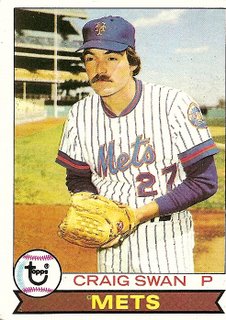 The plot thickens. Here, beyond question, is the very same Carmen Fanzone (see Carmen Fanzone, Part 1)
that my brother disputed the existence of, now dressed in a Mets
uniform and going by the somewhat more innocuous but still vaguely
fake-sounding alias of Craig Swan. However, unlike with Carmen Fanzone,
I remember Craig Swan. I saw him pitch at Shea and can clearly recall
knowing that one year he even led the National League in earned run
average, the only Met from the post-Seaver years who ever got anywhere
near a leader-board (which should have been the tipoff that something
was fishy). It's a little unsettling to look at one of the cards from
my childhood and have no memory of the player in the photo, but it's
downright jarring to realize that a player I do remember was merely an
ephemeral incarnation of an anonymous drifter who skirted the shadows
of a series of last-place ballclubs. As far as I know, his ruse was
never uncovered. Probably whenever the authorities started to zero in
on him, he simply moved on to the next half-empty stadium, leaving
behind nothing but a fake mustache. The plot thickens. Here, beyond question, is the very same Carmen Fanzone (see Carmen Fanzone, Part 1)
that my brother disputed the existence of, now dressed in a Mets
uniform and going by the somewhat more innocuous but still vaguely
fake-sounding alias of Craig Swan. However, unlike with Carmen Fanzone,
I remember Craig Swan. I saw him pitch at Shea and can clearly recall
knowing that one year he even led the National League in earned run
average, the only Met from the post-Seaver years who ever got anywhere
near a leader-board (which should have been the tipoff that something
was fishy). It's a little unsettling to look at one of the cards from
my childhood and have no memory of the player in the photo, but it's
downright jarring to realize that a player I do remember was merely an
ephemeral incarnation of an anonymous drifter who skirted the shadows
of a series of last-place ballclubs. As far as I know, his ruse was
never uncovered. Probably whenever the authorities started to zero in
on him, he simply moved on to the next half-empty stadium, leaving
behind nothing but a fake mustache.
Permalink |
No comments.
Carmen Fanzone, Part 1
2006-10-16 07:24
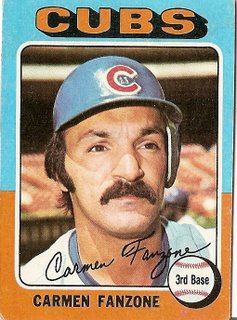 For
a long time, these cards lived in a box in a storage facility out by a
golf course in Randolph, Vermont, jammed in among broken furniture,
garbage bags full of faded clothing, disintegrating books, the
rolled-up canvasses of my mother's oil paintings, tarnished silverware,
etc., etc. The house I'd grown up in with my brother, mother, and
mother's longtime boyfriend, my second father, Tom, had been sold and
replaced by several small, separate, temporary living spaces inhabited
by my scattered family: Tom's condo by a manmade waterfall in
Montpelier, Mom's apartment within earshot of shootings in one section
of Brooklyn, the apartment I shared with my brother in another section
of Brooklyn that constantly trembled because of its proximity to
traffic on the Brooklyn-Queens Expressway, my dad's tiny monk-cell in
Manhattan. Nobody had an attic and nobody had the heart to just throw
away all the not quite necessary shit from that previous life of living
like people on television, together in a house. But nothing lasts
forever, not even the occupation of storage facilities. My mom and I
cleared everything out one summer in the mid-'90s when she took a
temporary job at a museum in Ohio. I took the baseball cards back to
New York and was looking through them and showing select cards to my
brother. When I showed him this card his reaction summed up the strange
and unexpected feeling of disconnection from the cards, as if the
iconic images of my youth had somehow been erased like the vanishing
scribblings on a shaken Etch-a-Sketch. Where was my childhood? Who were
these imposters? When my brother finally stopped laughing at the man in
this photograph, he declared: "There was never no fucking Carmen Fanzone!" For
a long time, these cards lived in a box in a storage facility out by a
golf course in Randolph, Vermont, jammed in among broken furniture,
garbage bags full of faded clothing, disintegrating books, the
rolled-up canvasses of my mother's oil paintings, tarnished silverware,
etc., etc. The house I'd grown up in with my brother, mother, and
mother's longtime boyfriend, my second father, Tom, had been sold and
replaced by several small, separate, temporary living spaces inhabited
by my scattered family: Tom's condo by a manmade waterfall in
Montpelier, Mom's apartment within earshot of shootings in one section
of Brooklyn, the apartment I shared with my brother in another section
of Brooklyn that constantly trembled because of its proximity to
traffic on the Brooklyn-Queens Expressway, my dad's tiny monk-cell in
Manhattan. Nobody had an attic and nobody had the heart to just throw
away all the not quite necessary shit from that previous life of living
like people on television, together in a house. But nothing lasts
forever, not even the occupation of storage facilities. My mom and I
cleared everything out one summer in the mid-'90s when she took a
temporary job at a museum in Ohio. I took the baseball cards back to
New York and was looking through them and showing select cards to my
brother. When I showed him this card his reaction summed up the strange
and unexpected feeling of disconnection from the cards, as if the
iconic images of my youth had somehow been erased like the vanishing
scribblings on a shaken Etch-a-Sketch. Where was my childhood? Who were
these imposters? When my brother finally stopped laughing at the man in
this photograph, he declared: "There was never no fucking Carmen Fanzone!"
Dick Pole and Peter LaCock
2006-10-15 11:28
 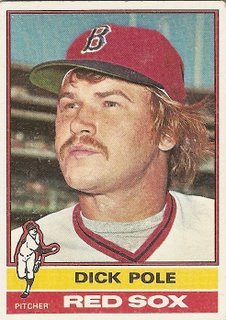 The single reason these two are yoked in the minds of many baseball fans is because they were exactly the same height (6'3") and weight (210 pounds). Though they each played in the American League throughout the 1977 and 1978 seasons, the sole instance in which they enacted the pitcher-batter swordfight was in the first inning of a game on May 28, 1978, between Dick Pole's Seattle Mariners and Peter LaCock's Kansas City Royals. The Seattle manager, whose name happened to be Johnson, yanked his Pole after Dick was abused for 4 hits and 5 runs in only 1 inning of work. The game was essentially decided by the time LaCock finally got his chance to further beat the spent Dick, but, for the record, the shriveled Pole teased LaCock into lining flaccidly to left. Len Randle
2006-10-14 06:49
 "But the point is to live." -- Albert Camus "But the point is to live." -- Albert CamusAnd now, in the final of my digressions honoring or at least mentioning players clad in the uniforms of all eight qualifiers for the 2006 playoffs (with a pause to honor the munsoning of Cory Lidle), here is the incomparable Lenny Randle, caught in the midst of an apparently enjoyable moment of homoerotic horseplay with a San Diego Padre first baseman, possibly Gene Richards. Happy thoughts come to my mind when I think of Lenny Randle, the first being--as it probably is for most baseball-minded people not named Frank Lucchesi--of a third baseman refusing the apparent doom of a perfectly bunted ball by cartoonishly pitching to his hands and knees to try to push the ball foul with deep exhalations from his lungs. But then I think of my dad, who always put aside his triple-hatred of riding the subway, sports, and crowds to take my brother and me to a ballgame at Shea once during each of our yearly visits to see him in New York City. While he spent most of these games either glaring at the New York Times or jamming his fingers in his ears to battle the sound of Laguardia jets passing close by overhead, my brother and I took a break from the grim, ominous march of rooting for the Red Sox by yelling carefree encouragement to the late-'70s Mets, who seemed paradoxically spectacular and incompetent: first baseman Willie Montanez making incredible scoops of wild throws that were already several seconds too late; catcher John Stearns forming a brick wall at home plate in hopes of impeding the runner as the relay peg sailed into the dugout; centerfielder Lee Mazzilli, cap flying free to reveal his immaculate Scott Baio feather cut, sprinting across the brown Queens grass in his notoriously custom-tailored, form-fitting uniform and diving stylishly for line dives that touched down yards away from his outstretched glove. Even the lingering vestiges of the Mets' glory days seemed affected by the glittering ineptitude, Jerry Koosman dashingly windmilling and firing his way to a 3--15 record, Ed Kranepool clouting pinch-hit drives to the warning track. But nobody epitomized this thoroughly enjoyable style of Rockette-kicking defeat from the jaws of victory as much as Lenny Randle. Lenny Randle may have been to some a talented disappointment but to me he was one of the few viable answers to what Camus would call the absurdity of existence. I mean, here we are, born to this life only to, well, put it this way: in baseball terms, we're going to eventually get thrown out, and it's not even going to be close. So why not ridiculously but sincerely try to stretch that bloop double into a triple? Why not fly into the stands to try to catch a foul ball headed for the loge seats? How many breaths do we get? Why not cartoonishly pitch to the grass and use a few of those breaths to push that perfect dying bunted ball to the other side of the white chalk line?
Permalink |
No comments.
Cory Lidle
2006-10-11 20:19
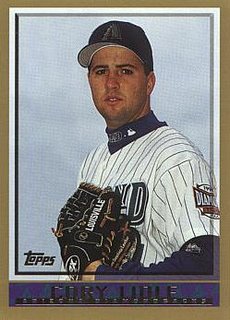 Cory Lidle's favorite word should have been aloha,
which means both hello and goodbye. Here's his 1998 rookie card,
fittingly showing him in the uniform of a team that sent him packing
before he ever played a single game for them. He'd made his major
league debut the year before for the New York Mets, then was the
thirteenth pick by the Arizona Diamondbacks in the 1997 expansion
draft. This was already the fifth major league transaction involving
Lidle, who would be tossed around by fourteen such transactions in all
before crashing his single engine airplane into a New York City
skyscraper. The Diamondbacks, who had gotten him from the Mets who had
gotten him from the Brewers who had gotten him from the Twins, passed
him on to the Devil Rays who passed him on to the A's who passed him on
to the Blue Jays who passed him on to the Reds who passed him on to the
Phillies who passed him on to the Yankees. He was never in one place
for longer than two years, and twice in his last three years he was
traded in mid-season. Early in his final year, even before the last of
the transactions, Lidle had spoken of his new hobby in glowing, almost
spiritual terms, as if he'd discovered the salvation of the journeyman.
"No matter what's going on in your life," he said, "when you get up in
that plane, everything's gone." Cory Lidle's favorite word should have been aloha,
which means both hello and goodbye. Here's his 1998 rookie card,
fittingly showing him in the uniform of a team that sent him packing
before he ever played a single game for them. He'd made his major
league debut the year before for the New York Mets, then was the
thirteenth pick by the Arizona Diamondbacks in the 1997 expansion
draft. This was already the fifth major league transaction involving
Lidle, who would be tossed around by fourteen such transactions in all
before crashing his single engine airplane into a New York City
skyscraper. The Diamondbacks, who had gotten him from the Mets who had
gotten him from the Brewers who had gotten him from the Twins, passed
him on to the Devil Rays who passed him on to the A's who passed him on
to the Blue Jays who passed him on to the Reds who passed him on to the
Phillies who passed him on to the Yankees. He was never in one place
for longer than two years, and twice in his last three years he was
traded in mid-season. Early in his final year, even before the last of
the transactions, Lidle had spoken of his new hobby in glowing, almost
spiritual terms, as if he'd discovered the salvation of the journeyman.
"No matter what's going on in your life," he said, "when you get up in
that plane, everything's gone."
Lerrin LaGrow
2006-10-11 06:37
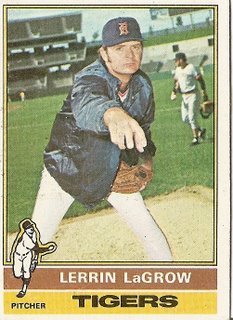
The Detroit Tigers are currently battling the Oakland A's in a playoff series for the first time since Bert Campaneris spiced up an otherwise forgettable 1972 series by tomahawking his bat in the direction of Lerrin LaGrow's head. The incident prompted Tigers manager Billy Martin, long renowned for his gentlemanly demeanor and even-keeled temperament, to calmly step onto the field of play and politely interview Campaneris on his reasons for taking such an unusual course of action. After a period of spirited but highly respectful discussion, Campaneris and Martin agreed to accept their differences as invigorating evidence of the world's rich tapestry of cultural and intellectual diversity. Some reports of the incident went to great lengths to capture Martin's enthusiasm for this debate and all suchlike debates in general by stating in highly exaggerated and clearly figurative terms that he had to be "dragged screaming" from the presence of his esteemed conversational partner. While there is no official consensus on the impact of this incident on the pitcher who sparked it by drilling Campaneris in the ankle, this 1976 card seems to suggest that the gradual but relentless impact of having narrowly avoided being brained by a Louisville Slugger may have edged Lerrin LaGrow in the direction of the black arts. As one who was simultaneously bored, confused, and creeped out by the Dr. Strange comics that Lerrin LaGrow apparently fell under the spell of, I am not qualified to comment on this with any authority, but my guess is that he has just uttered something along the lines of "By the hoary hosts of hoggoth" and is now attempting by hypnosis to shatter the mind of the photographer who hath deigned to try to capture his image with his mechanism of nefarious modernity. Joe Wallis
2006-10-10 07:12
 If
you're thinking that Joe Wallis does not look like a major league
baseball player, you're not really wrong. Wallis would never play a
major league game after this card hit the stores. If
you're thinking that Joe Wallis does not look like a major league
baseball player, you're not really wrong. Wallis would never play a
major league game after this card hit the stores.Not incidentally, Wallis didn't always look like this. He broke into the big leagues in 1975 with a well-trimmed goatee and collected 16 hits in 56 at bats for a respectable .286 average. One of the hits even garnered Wallis his single shred of enduring notoriety as it broke up a Tom Seaver no-hit bid with two outs in the bottom of the ninth inning. In 1976 and 1977, Joe Wallis sported long incurving sideburns and a thick mustache and hit .254 the first year and .250 the next. That style of facial hair devolved into a disorganized stubble and mustache look in 1978, when his average sunk to .249 while he split time between the go-nowhere Chicago Cubs and the thoroughly gutted Oakland A's. During 1979, as the stubble expanded toward the unruly beard shown here, Wallis's average guttered to .141. He moved outside the realm of recorded history after this, but anecdotal evidence suggests that his beard grew longer and longer throughout the 1980s, and as it did so Joe Wallis eliminated from his life more and more of what he came to see as the entrapments of a thoroughly corrupt modern civilization. He threw his television out a 12th story window in 1982, stopped using electricity in 1984, ceased showering in 1987, began living in a tipi in 1991, and some time in the mid-1990s disappeared altogether, maybe or maybe not partially or fully responsible for occasional sightings in the forests of the Pacific Northwest of a profoundly hairy humanoid creature unable or unwilling to respond to verbal inquiries or hit a curveball. Bobby Valentine
2006-10-09 08:50
Vic Albury
2006-10-08 11:08
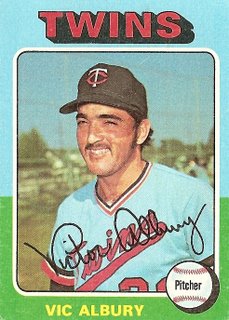 The following is from the transactions section of Vic Albury's page on baseball reference.com: The following is from the transactions section of Vic Albury's page on baseball reference.com:"Before 1969 Season: Sent from the Cleveland Indians to the San Diego Padres in an unknown transaction." This photo, taken six years after the mysterious deal and mere seconds after the toking of what I am certain Vic Albury referred to as "some primo shit," suggests that the last person who would know or care why and how Vic Albury went from the Indians to the Padres was Vic Albury. Steve Garvey
2006-10-06 07:27
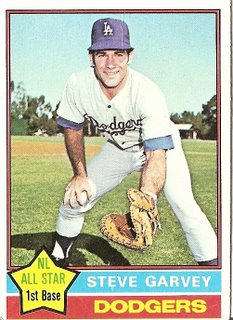 "The formula 'two and two make five' is not without its attractions." -- Fyodor Dostoevsky, Notes from Underground "The formula 'two and two make five' is not without its attractions." -- Fyodor Dostoevsky, Notes from UndergroundThe perfect all-American asphyxia-blue two-plus-two-makes-four symmetry of this 1976 card is broken only by the reaching out of the 1974 NL MVP's glove hand, an aesthetic disturbance that seems to call on the viewer to complete some larger symmetrical pattern. An honorable, well-adjusted, Garveyesque man would respond to this beckoning with a fittingly direct rock-jawed all-American reply. A firm handshake. A straight brisk overhand strike. A logical balancing of the equation. Why does the only answer that appeals to me involve dropping a hefty deuce in the webbing of Steve Garvey's mitt? Thurman Munson
2006-10-05 06:51
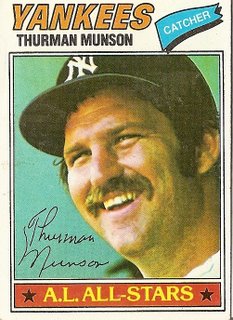 Finding
a Yankee in a pack of cards was like finding a mold-blackened orange in
your trick-or-treat bag. I valued the never realized (nor even
approached) goal of completing the year's collection too much to throw
the offending cardboard in the garbage, as I would the orange, but I
tried to get the Yankee cards away from the others as soon as possible
and out of sight so I could engage in my time-dissolving card-aided
daydreams without the sharp sliver of festering resentment in my
nostrils. Some of the cards were less offensive than others, the
mushroom-cloud hair of Oscar Gamble, the innocuousness of Roy White,
the hilarious storytelling ability of Sparky Lyle, and the mere name of
Mickey Klutts among the few effective truce-making offerings from the
world of my enemies. On the other hand, some Yankees were capable of
making the whole pack they came in feel tainted, including perennial
asshole-of-the-year Reggie Jackson, simian brawl-instigator Lou
Piniella, the bat-corking duo of shoulder-maimer Graig Nettles and
sucker-puncher Mickey Rivers, and a certain weak-hitting prettyboy
shortstop whom I'm not quite ready to mention by name. Finding
a Yankee in a pack of cards was like finding a mold-blackened orange in
your trick-or-treat bag. I valued the never realized (nor even
approached) goal of completing the year's collection too much to throw
the offending cardboard in the garbage, as I would the orange, but I
tried to get the Yankee cards away from the others as soon as possible
and out of sight so I could engage in my time-dissolving card-aided
daydreams without the sharp sliver of festering resentment in my
nostrils. Some of the cards were less offensive than others, the
mushroom-cloud hair of Oscar Gamble, the innocuousness of Roy White,
the hilarious storytelling ability of Sparky Lyle, and the mere name of
Mickey Klutts among the few effective truce-making offerings from the
world of my enemies. On the other hand, some Yankees were capable of
making the whole pack they came in feel tainted, including perennial
asshole-of-the-year Reggie Jackson, simian brawl-instigator Lou
Piniella, the bat-corking duo of shoulder-maimer Graig Nettles and
sucker-puncher Mickey Rivers, and a certain weak-hitting prettyboy
shortstop whom I'm not quite ready to mention by name.I counted Thurman Munson in that latter group. Yankee captain, leader of the bullies, picker of fights with Carlton Fisk. Here he was, befouling my pack with his smile. This smile, as incongruous on Thurman Munson as a note-for-note cover of a James Taylor ballad on a Ramones record, was probably interpreted by me as connoting the fact that the Yankees had just won the 1976 pennant, their first since I had been paying attention. I had already begun my lifelong search for answers in the baseball encyclopedia and knew that this turn of events was a return to the status quo, and so this smile struck me as that of a wealthy unshowered aristocrat learning that his prodigious fortune had just been doubled by sheer chance. Things only got worse. In 1977, the Yankees beat out the Red Sox in a close division race on their way to their 21st World Series championship, then in 1978 humiliated the Red Sox by obliterating a gigantic late-season deficit and thumping them in a one-game playoff before tallying championship number 22. What can I say? It hurt. The following winter, I looked to my baseball encyclopedia for solace and studied freakishly similar failures stretching into the past as far as the eye could bear to see. All this is merely to explain that by the summer of 1979, when I was 11, I hated Thurman Munson. Now, without further delay, a short ugly story: one day in the summer of 1979 my brother and I were travelling from Vermont on a Greyhound bus to see our dad, who lived in New York City. It must have been crowded because I wasn't sitting with Ian but with a short, mustachioed guy in his early 20s. He looked a little like Thurman Munson, actually, and he was even a Yankees fan. He was friendly, though, and we talked about baseball all through the first few hours of the ride, before the mid-trip 15-minute break in Springfield, Mass. During that break, everybody got off the bus. I don't know where the guy sitting next to me went, but my brother and I hit the vending machine that sold the big boxes of M&Ms our dad always showed up with on his Greyhound visits to Vermont. I was back in my seat shoving fistfulls of the candy in my mouth when the guy with the mustache reboarded looking glum. I swung my knees out to let him into his window seat. He lowered himself down and whispered that Thurman Munson had just died. "Crashed his plane," the guy explained, but I was already turning and rising to relay the news to my brother, M&Ms clicking against the inside of smile-bared teeth, my voice like a recess bell. When I sat back down my seatmate was staring at me. I offered him some M&Ms, my smile congealing. "No thank you," he said. He turned and looked out the window. The bus pulled out of the station. He kept on looking out the window, for hours, all the way to Port Authority. Rich Folkers
2006-10-04 05:56
Andy Etchebarren
2006-10-03 11:03
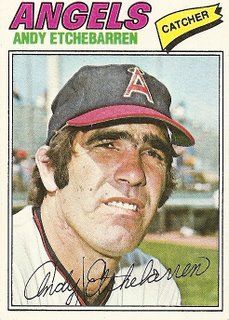 I'm
not usually a conspiracy theorist, but I think major league baseball
might have been up to something in its dealings with Andy Etchebarren. I'm
not usually a conspiracy theorist, but I think major league baseball
might have been up to something in its dealings with Andy Etchebarren.Point 1: Many catchers attempt to lessen the punishing toll of their grueling chores by learning to play another much less demanding position, usually first base or left field. The Cardboard God era provided ample evidence of this practice; for example, the all-star perennials of that time--Fisk, Munson, Carter, and Bench--all took occasional breaks from finger-fracturing foul tips and constant knee-ruining squats to feel the wind in their hair in the outfield or chat about their sailboat with baserunners about to take a lead off of first. By contrast, in his entire 15-year career, Andy Etchebarren was never once permitted to man a fielding position that did not require that his face be entirely covered by a mask. Point 2: Though he showed signs of being ready earlier, Andy Etchebarren was only allowed to become a major league regular in 1966, the year after Don Mossi retired. Despite the unspoken quota system this restriction seems to imply, Etchebarren nonetheless came moments away from facing Mossi in the 9th inning of a late-season game during a brief call-up in 1965. At that time, Mossi, the Babe Ruth of ugly, was a left-handed specialist most often brought in to face left-handed batters, and Etchebarren was on the cusp of a long career in which he would generally be used as the right-handed-batting specialist in catching platoons. In other words, there seems to be no traditional reason for Etchebarren to have been lifted from the game for a pinch-hitter, but lifted he was, for a .231-hitting journeyman named Dick Brown, thus preventing a matchup that would have given children nightmares long after they had ceased to be children. '78 Rookie Outfielders
2006-10-01 12:47
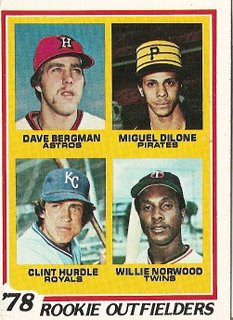 Yesterday,
the second-to-last day of regular-season baseball in 2006, Colorado
Rockies manager Clint Hurdle began his sparsely-attended post-game news
conference with a plea: "Don't accuse me if I don't remember."
Presumably, he was referring to the 5½-hour extra-inning game between
last place teams that had just concluded at Wrigley Field. As Hurdle
massaged his head and offered his spotty testimony, I walked from
Wrigley in the rain to catch the Ashland Avenue bus home, shivering
below my flannel shirt for a few different reasons. Yesterday,
the second-to-last day of regular-season baseball in 2006, Colorado
Rockies manager Clint Hurdle began his sparsely-attended post-game news
conference with a plea: "Don't accuse me if I don't remember."
Presumably, he was referring to the 5½-hour extra-inning game between
last place teams that had just concluded at Wrigley Field. As Hurdle
massaged his head and offered his spotty testimony, I walked from
Wrigley in the rain to catch the Ashland Avenue bus home, shivering
below my flannel shirt for a few different reasons.I'll try to remember what Clint Hurdle can't (or chooses not to), but first a few words about the amnesiac pictured here in a card that started showing up in packs in the spring of 1978, around the time Sports Illustrated put Clint Hurdle on its cover. My brother had a subscription to the magazine, and I vaguely recall that the cover featured Clint Hurdle kneeling in the on-deck circle next to the blazing, dooming question: "The Next Mickey Mantle?" As it turned out, of course, Clint Hurdle didn't become the Next Mickey Mantle, or even the Next Bobby Murcer. In fact, you could argue that Topps made the much better call on Hurdle's future, sardine-canning him with three other guys who would have comparably unremarkable but not awful careers. Of the four, Hurdle almost certainly had to deal with the most pressure, the crushing weight of expectation on his shoulders from his first moments in professional ball. For a while there, everyone was waiting for Clint Hurdle to do something historic. Obviously, he never did. But I as far as I can tell (and I've been researching it all morning), last night Clint Hurdle combined with the Cubs' manager, dead-man-walking Dusty Baker, to use more pitchers than have ever been used in a single game in the history of major league baseball. I was unable to find an actual record for this, but I did find reports of a game on 9/25/92 between similarly long-eliminated teams, the Texas Rangers and Seattle Mariners, in which the record for most players in a game was set (54; the game I saw yesterday featured 50). In the 1992 game, according to the September 25 page on Baseball Reference.com, the record for most pitchers used by a single team was also set, by the Mariners (11). By powers of deduction (or induction--I never got straight which was which), I add the fact that the Rangers only used 5 pitchers (eliminating that game from consideration) to the fact that the most pitchers any team had ever used in a game prior to that was 10 to conclude that the record for most pitchers used in a game by both teams could not be any higher than 20, and since the previous record for one team was unlikely to have been set or matched by two teams in the same game, I am going to decide for my own self anyway that if any two teams ever combined use 20 pitchers in a single game they would have accomplished something unprecedented in major league history. And so, yesterday, as the rest of the world raked leaves or yelled about college football or spent time with their loved ones, I watched 20 pitchers take the mound (and in fact, by virtue of a wrinkle that made me feel for a few seconds like I was 8 years old again, I saw 21 pitchers in all, but more on that later). Pardon me for getting biblical, but these obscure singularities of negligible worth are the visionary pinnacles of my solitary religion, so here is the entire litany: Jeff Francis, Nate Field, Jeremy Affeldt, Manny Corpas, Tom Martin, Brian Fuentes, José Mesa, Ray King, Mike Venafro, Ramón Ramírez, Juan Mateo, Les Walrond, Ángel Guzmán, David Aardsma, Michael Wuertz, Ryan Dempster, Bobby Howry, Roberto Novoa, Will Ohman, and Jae Kuk Ryu. The winning pitcher, Ramón Ramírez, entered the game with one out in the 13th inning. By this time, the great majority of the crowd had left. Many had trickled out at various stages during the first nine innings, during which the Cubs had fallen behind eight to nothing, and there was a large exodus (including the friend I had come with) during a significant rain delay in the bottom of the 11th. What does it say about me that that rain delay--a prolonged meaningless pause in a game that with its complete lack of competitive ramifications was itself a meaningless pause that was in the paused process of being prolonged meaninglessly into extra innings--was one of the happier moments of my life? A guy for once in his life could just sit there and watch the fucking rain come down. I had moved down close to the field on the first base side by the 13th, and I was starting to shiver both from the damp cold and from the growth of my private impossible hope that time itself had somehow been defeated, that the unimportant contest before me would remain undecided forever. With two outs in the inning, Cubs star Aramis Ramírez singled off Ramón Ramírez. Matt Murton came to the plate and was in the process of working a walk when I heard shouting behind me, something that ended with the words "you'll never play baseball again!" I thought at first it was the kind of drunken barking loosed at ballgames in a jocular pantomime of anger, but I would be able to revise that view when a man stalked past me down the steps of the aisle and grabbed the shoulder of a blond teenaged kid sitting three rows in front of me. "Get in the car!" the man shouted, a wiry, tightly-wound guy in his early 40s. He hit the kid hard in the face with his open right hand. The kid was wearing an Aramis Ramírez jersey. "Get in the car! We've been waiting in the car for an hour! You think the whole world revolves around you? Get in the goddamn car! I've got kids that need to get to bed. We'll leave you in the city. Get in the car!" The man and the kid went back up the aisle past me, the man with a tight grip on the kid's arm. "Don't think I won't break your fucking shoulder" was the last thing I heard. Murton trotted to first after ball four, but then Jacque Jones stranded Aramis Ramírez at second. I went down below the stands and called my wife from a pay phone then went back up to the game, this time sitting on the third base side behind the home team's dugout. I sat there, my shivering now including the knowledge that I had just watched some kid's childhood die a violent death. The Rockies scored two runs. In the bottom of the 14th the pitcher's spot came up with two men out and Cubs shortstop Ronny Cedeño on first. A couple 8-year-olds with their hats turned inside out to pray for rallies had wandered into my row. They were standing, and I rose from my shivering seated position to join them, realizing at the same time they did what was about to happen. The Cubs had basically used all their guys. They had almost nobody left. Dusty Baker, who had endured the entire game with some prick directly across from the home dugout waving a "Bye Bye Dusty" sign at him, responded to the crisis with admirable style. He sent good-hitting pitcher Carlos Zambrano, who had pitched and lost the previous day's game, to the plate to pinch-hit. The 21st pitcher. He didn't have a stellar batting average but he had some power. Everyone still in the park had seen him, as I had, catch hold of one before. He could do it. He could tie the game. "Come on, big C!" the eight-year-old standing closest to me yelled. "Come on, Carlos!" I found myself yelling. "Come on, big man, give it a ride!" Eventually Zambrano lifted a fly ball to the outfield. Centerfielder Brad Hawpe settled under it, but just before the end of the ball's dim arc Hawpe slipped on the wet grass. His right leg went out from under him and his left knee buckled. For Clint Hurdle, the inconsequential game began to dissolve the moment it ended. But for me, the only part of the game I want to dissolve is Zambrano's attempt sinking into a stumbling fielder's glove just inches above the grass. I want my final memory of the game to be Hawpe slipping and Cedeño and Zambrano rounding the bases with all their might and the inevitable seeming for the thinnest possible moment like it might once again be delayed. |